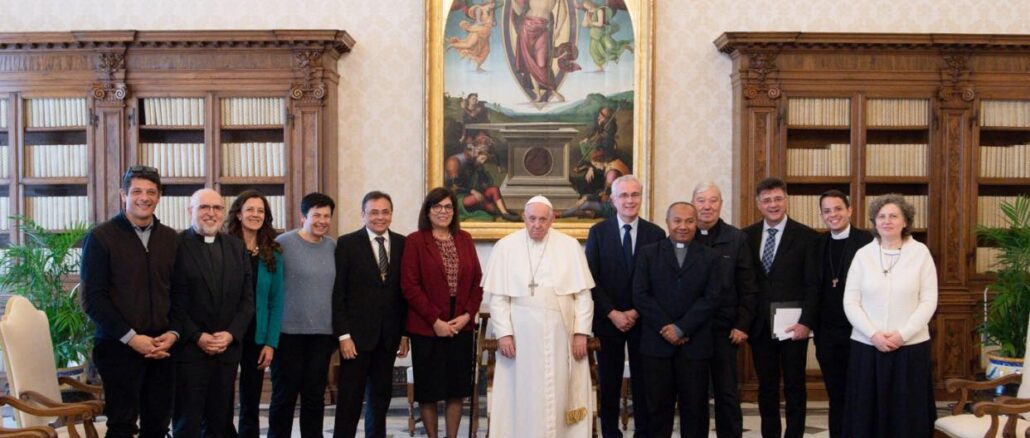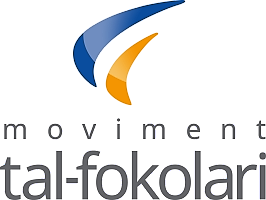
Rocca di Papa, 3 March 2023
These were Pope Francis’ concluding words after the days spent together in a spirit of communion by leaders of movements and new ecclesial communities. On the preceding days they had met with the Dicastery for the Laity, Family and Life.
“It all began following the 3rd World Conference of Movements and New Communities in November 2014 and continued in meetings in the following years. We discussed topics of common interest: consecrated life in Ecclesial Movements and New Communities, fellowship and mercy, the charism and institutions, identity. We could say it is a synodal path, characterised by a growing mutual esteem, and an affective and effective friendship”.
In this way, Margaret Karram, president of the Focolare Movement, explained the background to the gathering of moderators, presidents, and collaborators of five Movements and New Communities held from 22nd to 24th February.
As well as the president and co-president, Jesús Morán, of the Focolare Movement, the meeting was attended by Michel Bernard De Vregille of the Emmanuel Community, Frei Hans Stapel, Nelson Giovanelli and Fr Jose Luiz Menezes of the Famiglia della Speranza, Moyses Louro de Azevedo Filho of the Catholic Community Shalom, and Chiara Amirante of Nuovi Orizzonti. The first day was spent preparing for the meetings that took place on the following days.
The first was at the Dicastery for the Laity, Family and Life, where the group was welcomed by Cardinal Kevin Farrell and his collaborators. Encouraged by the Cardinal’s desire to listen, and to know more about their experiences, especially in the fields of vocation, formation and mission, a lively discussion took place. It was an experience synodality in action, based on trust, freedom and fraternity. Many points were considered, but above all the emphasis was on evangelisation, as an expression of God’s love and of communion-fellowship in the Church.
Cardinal Farrell noted that our present times call for a proclamation based on the witness of men and women who journey with everyone, in the various spheres of daily life, but who have the ‘beatitudes in their hearts’ and are capable of tenderness, sharing, and giving.
The concreteness of love heals wounds and accompanies people in the ups and downs of daily life; and that is what changes people. In this field, the Movements and New Communities play a very important role as laity in the Catholic world. They have been given life by the Holy Spirit to respond to the needs of the times and to proclaim the Gospel to all, especially to young people.
Many experiences were shared by those present: stories of commitment, deep involvement in local, cultural and social realities in the different contexts in which they live; commitments carried out according to their specific charism and also together. Significantly, Cardinal Farrell repeatedly referred to the experience of the “Centro de Espiritualidade Uirapuru” in Fortaleza, Brazil, where some twenty Movements and Communities collaborate. In an atmosphere of true joy, the Cardinal encouraged everyone to continue their dialogue with frequent meetings and always to maintain a living communion-fellowship among all.
On the following day, a private audience with Pope Francis took place in the Vatican Library. They spent 40 minutes in spontaneous, joyful, profound and ‘timely’ dialogue on the most topical questions and challenges of people today and of the ecclesial movements themselves. The Pope gave valuable insights, which can be a guide for all Movements and New Communities. Since it was a private audience, no recordings or texts are available, but here are some of the topics discussed. He told those present that the movements have a specific characteristic, that of being a ‘movement’; therefore, they must be careful not to give in to ideologies, not to let themselves be held back by schedules or plans that are too rigid, but to look to the future, being open to the surprises that the Holy Spirit suggests, and be courageous. He went on to say that they must know how to take risks, but with prudence and discernment. Other subjects spoken about were evangelisation, the poor and young people; on each subject the Pope gave “pearls of wisdom” that opened their hearts to the measure of a love that is concrete and truly close to people.
The Marian principle of the Church was strongly emphasised, on which work still needs to be done, because it is essential to the life of the Church. The Pope affirmed that Petrine theology has been highly developed, but Marian theology less so. The Church is built on both, and Marian theology is fundamental. As if to confirm what had been said, when the Pope saw the gift he had been brought, a statue of Our Lady of Welcome from Centro Ave in Loppiano, he exclaimed that this truly expresses the Church.
Stefania Tanesini, Chiara Cuneo, Marc St-Hilaire
Photo: © Vatican Media

Be the first to comment